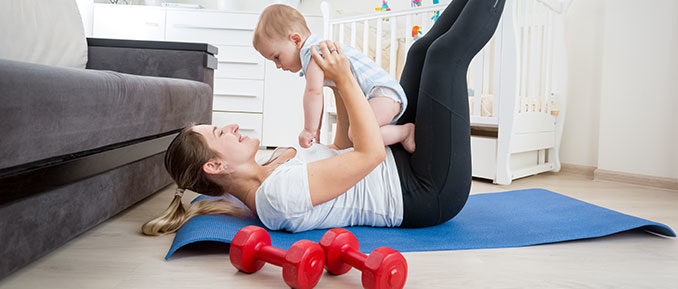
Exercising your body and your brain are two ways to improve your own health. It’s well known that physical and mental activity can boost learning ability and reduce risk for diseases such as Alzheimer’s. But, could doing so also directly benefit your future children?
New research in Cell Reports indicates that a child’s capacity for learning could actually be boosted as a result of the physical and mental exercise that their parents carried out before they were born.
Researchers are discovering that certain life experiences and their consequences could be passed on to the next generation through epigenetic marks on DNA, a phenomenon called epigenetic inheritance.
For example, these chemical tags could be influenced by a father’s diet, epigenetically impacting his offspring’s mental fitness. A father’s stress felt before his child is conceived may set up his kid for high blood sugar later down the road. Although many are conducted using animal models, studies continue to mount on this fascinating topic and the connections we can draw to humans.
According to researchers from the German Center for Neurodegenerative Diseases (DZNE) in Goettingen and Munich and the University Medical Center Goettingen (UMG), mice that are exposed to an enriched environment with mental and physical exercise can epigenetically bestow their offspring with heightened learning ability.
This form of inheritance was found to be mediated by RNA molecules that adjust gene expression, specifically miRNA212 and miRNA132. The researchers discovered these molecules accumulated in the brain as well as in germ cells after mental and physical activity.

Professor André Fischer, senior scientist at the UMG and DZNE Goettingen, and his team investigated whether the ability for learning could be epigenetically inherited. In a mice study, they showed that learning ability was indeed passed down via epigenetic inheritance, specifically through the actions of microRNA (miRNA) molecules.
First, Fischer exposed mice to a stimulating environment which included toys, in the form of tunnels, housing, and differently shaped objects, and running wheels. Then the scientists used tests to measure their offspring’s learning ability.
Compared to the control group, the offspring whose parents engaged in physical and mental exercise performed much better on the learning tests. Additionally, these mice saw a boost in their synaptic plasticity in a region of the brain crucial to learning, the hippocampus. The greater the synaptic plasticity, the greater the ability nerve cells can communicate with each other, which forms the cellular basis for learning.
Then they looked at which epigenetic mechanism might be responsible for this. Sperm carries epigenetic marks and has been shown to transfer them to offspring. It contains paternal DNA and RNA molecules, so the researchers conducted experiments to see how the RNA molecules played a role in inheriting learning skills.
They extracted RNA from the sperm of mice that were physically and mentally active and then injected the RNA into fertilized egg cells. The team found that once the babies developed, they had heightened synaptic plasticity and advanced learning ability. The group concluded that mental and physical activity conferred a positive effect on the offspring’s cognitive ability. Ultimately, the RNA in the sperm mediated this effect.
The scientists more closely investigated the influence of microRNAs on epigenetic inheritance and boosted learning ability. They discovered that two microRNAs – miRNA212 and miRNA132 – could be responsible for at least some of the inherited learning capacity.
“For the first time, our work specifically links an epigenetic phenomenon to certain microRNAs,” said Fisher.
These two molecules were also found in the brains and sperm of mice who completed mental and physical activity. It was previously understood that these two miRNAs help to form synapses in the brain, contributing to learning ability. They are transmitted to the next generation through the sperm.
“Presumably, they modify brain development in a very subtle manner improving the connection of neurons. This results in a cognitive advantage for the offspring,” Fischer explained.
We know that physical exercise and cognitive tasks can help improve learning ability in humans. Although it isn’t as easy to study the epigenetic inheritance of learning ability in humans, these results still contribute to our understanding of the fascinating topic. The group of researchers now plan on uncovering whether these two microRNAs accumulate in sperm of humans after completing physical and mental exercise.
Source: Benito, E. et al. (2018). RNA-Dependent Intergenerational Inheritance of Enhanced Synaptic Plasticity after Environmental Enrichment. Cell Reports, 23(2): 546.
Reference: Science Daily. Does physical activity influence the health of future offspring? Science Daily. 29 May 2018. Web.


